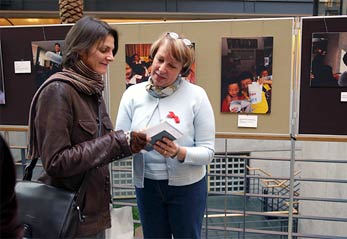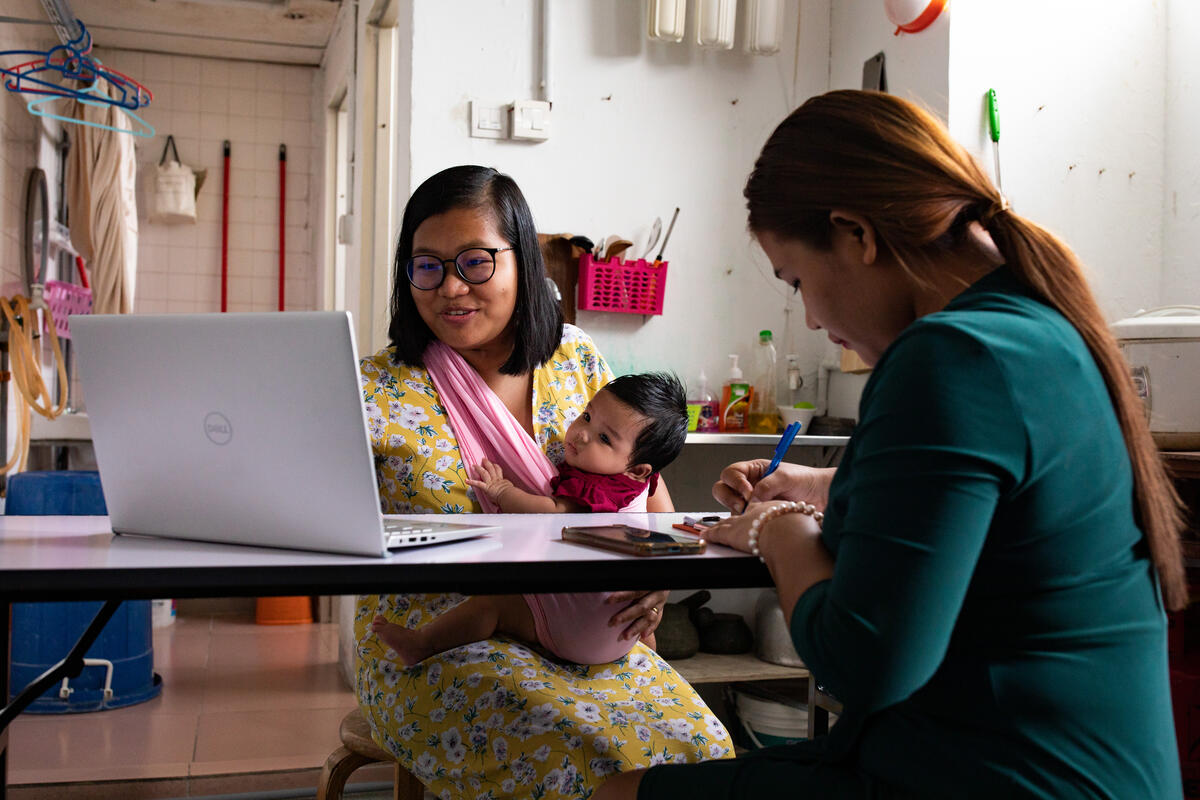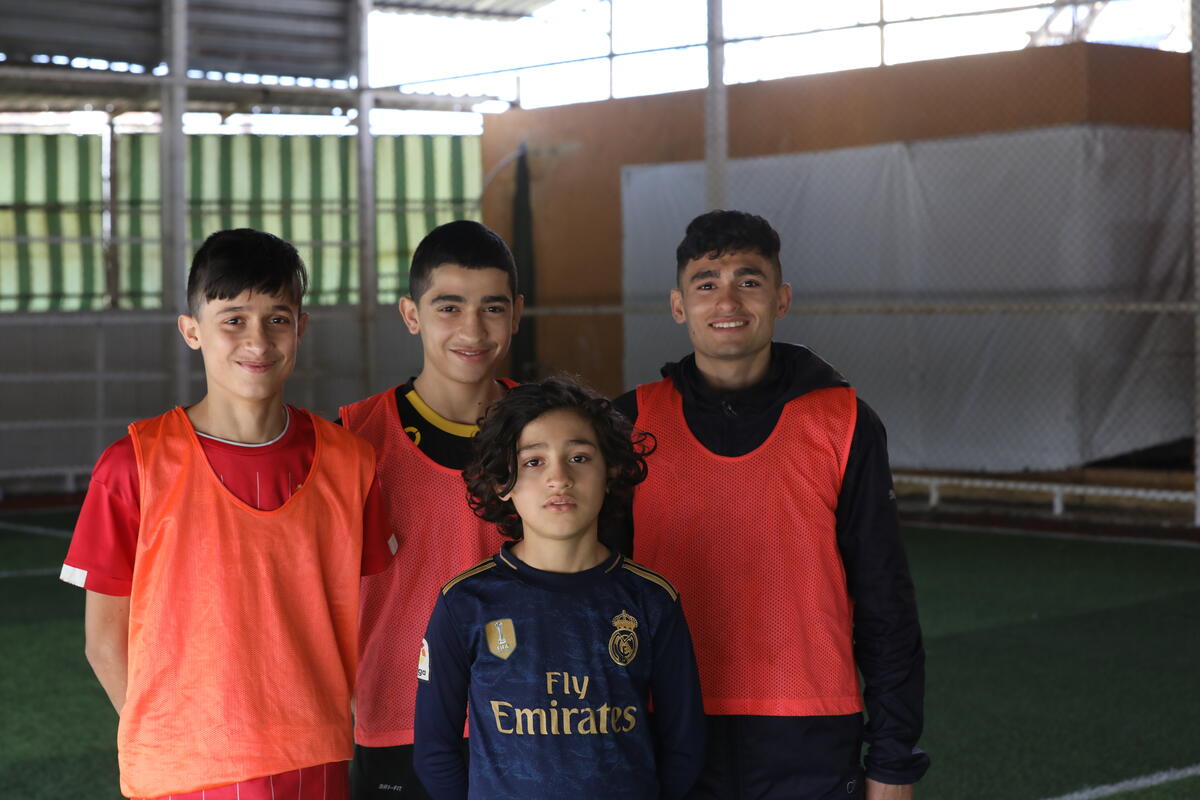UNHCR reaffirms commitment to combat HIV/AIDS
UNHCR reaffirms commitment to combat HIV/AIDS

GENEVA, Dec 1 (UNHCR) - The UN refugee agency today commemorated World AIDS Day, calling for refugees to be included in HIV/AIDS prevention and treatment programmes, while at the same time dispelling the misperception that refugee populations always have greater rates of HIV/AIDS than national populations.
In an opinion piece on World AIDS Day, High Commissioner Ruud Lubbers wrote, "The trauma of war, violence and persecution, followed by the misery of exile, are often the sad destiny of refugees. In parts of the world affected by HIV/AIDS, the plight of the uprooted is even worse. Not only are refugees accused of spreading HIV and other diseases, but they are often excluded from multi-million-dollar HIV/AIDS programmes."
He called stigmatising refugees as HIV carriers "morally repugnant" and "grossly unfair", noting recent studies showing that in some countries, refugees have lower HIV rates than the surrounding population.
High Commissioner Lubbers addressed UNHCR staff and the public at an event at the agency's Geneva headquarters on Monday, when he called for UNHCR to ensure that refugees live in dignity, free from discrimination, regardless of their HIV status, to provide at least the core HIV/AIDS interventions during emergencies and more comprehensive programmes linking prevention to care in stable situations.
Safiye Cagar, Director of the UN Population Fund (UNFPA)'s Office in Geneva, and Kevin Ryan, Director of the Positive Lives Project, also spoke at the Geneva event. Awareness-raising items and goods made by people living with HIV/AIDS in South Africa were on sale, with proceeds going towards people living with the disease. Condoms were also distributed on the day.
The event featured a photo exhibit called the Positive Lives Exhibition, which depicts people living with HIV/AIDS in a positive manner. The exhibit travelled to refugee populations and camps in Angola, Namibia and South Africa in September and October in the run-up to World AIDS Day. It served as a starting point for discussion groups among the populations with the aim of reducing discrimination and stigmatisation.
UNHCR has increased its resources and efforts to combat HIV/AIDS in the past 18 months, expanding activities in Africa and hiring three regional HIV/AIDS coordinators. The agency has focused its resources for HIV/AIDS on Africa, which faces the world's highest HIV/AIDS rates and hosts the second largest population of refugees. In 2004, UNHCR plans to expand its efforts to West Africa and Asia.
In nearly a dozen countries, from Angola to Zambia, UNHCR carries out education campaigns to encourage refugees to protect themselves against the virus, and to reduce the stigmatisation of people living with HIV/AIDS. Other efforts include condom promotion, improving health and community services, voluntary counselling and testing, training of health workers and camp staff, income generation activities for people living with HIV/AIDS, and home-based care to allow affected individuals to receive the attention they require while remaining near loved ones in a familiar environment.
The refugee agency's increased focus on HIV/AIDS appears to be having an effect.
Paul Spiegel, UNHCR's Senior HIV/AIDS Technical Officer, has observed a change both within and outside the agency. "UNHCR staff, both at headquarters and in the field, are beginning to understand the consequences that HIV/AIDS currently is having on refugees' protection, health and general wellbeing. It will only worsen in the future. Meanwhile, host governments and donors are slowly beginning to realise that refugees cannot be excluded from HIV/AIDS programmes that target their nationals. By doing this they are only fighting part of the battle."
In Southern Africa, field staff also report positive results of the agency's awareness efforts. "The biggest impact we have seen in the past year is that returnees to Angola are more aware of HIV/AIDS because of the intensive education activities that have been going on in the camps in host countries," said Laurie Bruns, UNHCR's Regional HIV/AIDS Coordinator in South Africa. "We hope that because of this heightened awareness, the refugees will contribute to HIV/AIDS education in Angola itself on their return to their home communities."
World AIDS Day events were also organised in various field operations with refugees themselves.
In South Africa, where refugees live in urban settings rather than camps, UNHCR and its implementing partners have promoted refugee participation in World AIDS Day events planned by local government and civil society groups. Refugee youth and refugee women have been particularly encouraged to participate in the day's activities.
In refugee camps in Namibia and Zambia, and other countries in the region, intensive awareness campaigns have been conducted in the days and weeks leading up to World AIDS Day. The campaigns use creative media such as drama, music and poetry to convey the messages of non-discrimination and positive living throughout the refugee and local communities. In the Democratic Republic of the Congo, two Congolese women with HIV/AIDS visited Kilueka camp to share their experiences and put a human face to the disease.
Other activities in the field included a press conference on HIV/AIDS issues with other UN agencies in Kyrgyzstan, and information materials distributed to Afghan refugees returning home from Iran. In Serbia and Montenegro, UNHCR has been active together with other UN agencies in publicising World AIDS Day through television spots, media outreach and training, posters and other awareness-raising events.
UNHCR is also focusing globally on HIV/AIDS in the workplace, distributing to all staff worldwide the International Labour Organization (ILO) code of practice on HIV/AIDS and the world of work. Post-exposure prophylaxis (PEP) treatment kits have also been given out to offices in the field, accompanied by training for staff on how to use them to reduce the chance of HIV infection after exposure through sexual assault or occupational exposure.
At the Geneva event, the speakers highlighted this year's World AIDS Day theme against stigma and discrimination under the slogan, "Live and Let Live". High Commissioner Lubbers and UNFPA's Cagar noted the particular difficulties of stigmatisation faced by refugees.
"HIV and AIDS do not discriminate and we must not either," said Cagar.








